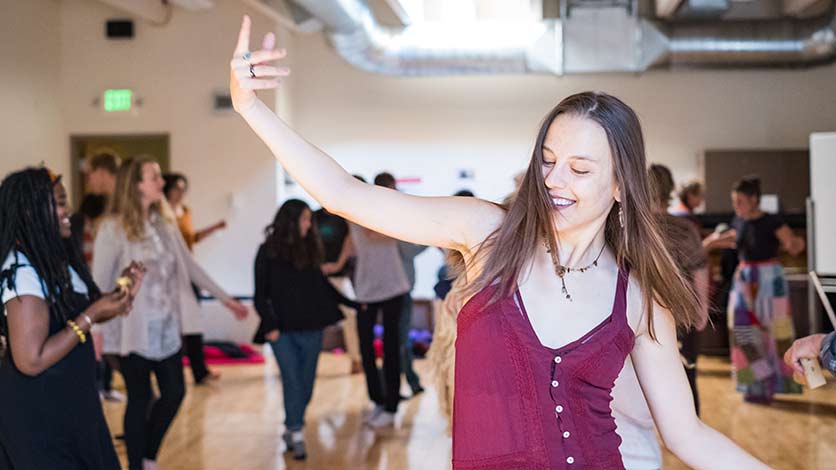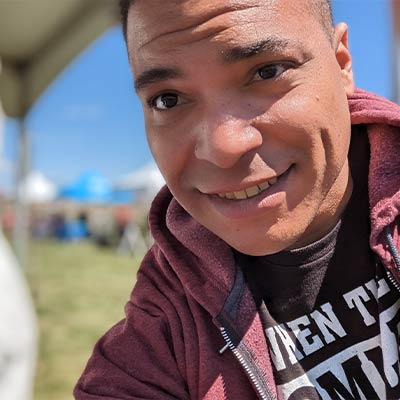Clinical Mental Health Counseling MA
Somatic Counseling: Dance/Movement Theories & Practice Concentration
Gain clinical counseling skills and experience firsthand the healing potential of dance with Naropa’s Somatic Counseling: Dance/Movement Theories & Practice concentration.
About this Concentration
This unique concentration combines movement therapy with contemplative practice and clinical mental health counseling.
The Dance/Movement Theories & Practice concentration provides students with the theoretical, clinical, and professional skills to be effective counselors grounded in the integration of body, mind, and movement.
In this concentration, you’ll encounter both traditional and innovative dance/movement therapy approaches while exploring self-psychology, the Gestalt-influenced movement cycle, and applied neuroscience.
Beyond its academic depth, the master’s program in dance therapy offers opportunities for physical, spiritual, and emotional development. You’ll delve deeply into creative methods for client interaction, employing improvisation, rhythm, and metaphor to discover and express your authentic self.
Movement Therapy Certification
Naropa’s Dance/Movement Therapy program is one of only seven dance therapy degrees approved by the American Dance Therapy Association. Naropa’s Somatic Counseling tracks are designed to help students gain the certifications they need for successful careers as dance movement therapists.
Practicum and Internships
Participants in the program must fulfill a practicum and engage in a 700-hour clinical internship, emphasizing impactful service and enabling observation and involvement within the mental health and broader community as incoming therapists. These experiences expose students to diverse populations, fostering familiarity and enhancing their community comfort level.
Holistic Study
Naropa’s course offerings are designed to create a matrix of learning in which study in each area connects and complements study in other areas. As students concentrate on a particular course, they are prompted by experienced faculty to consider insights and interconnections from other classes.
Quick Facts
- On-campus program
- Deep integration of Clinical Mental Health Counseling interventions for movement and mind/body connection
- One of only seven dance therapy programs approved by the American Dance Therapy Association
- 64 Credit Hours
- 900 hours of Clinical Experience
- 3-year Degree
- Licensure and Certification Support
- Now Accepting Applications for August 2024
Program Format
The MA in Clinical Mental Health Counseling, Somatic Counseling: Dance/Movement Theories & Practice Concentration is a three-year on-campus program that focuses on counseling, the healing potential of the creative experience, and the therapeutic properties of conscious movement sequencing.
Students in the concentration receive robust training in somatic movement therapy’s theoretical aspects. Alongside, they delve into mindfulness practices and accumulate hands-on clinical expertise.
While pursuing your Clinical Mental Health Counseling degree, you’ll understand the essential and dynamic exchange between mind and body as both elements continuously influence one another in a symbiotic relationship.

Course Spotlight
Current Methods & Skills in Psychotherapy
Degree
Requirements
The Dance/Movement Theories and Practice Concentration spans 64 credits over three years, emphasizing counseling skills, harnessing the transformative power of creative experiences, and using intentional movement sequencing for therapeutic benefits.
The concentration is designed to follow standards for Clinical Mental Health Counseling as well as guidelines from the American Dance Therapy Association (ADTA). The concentration has been an ADTA-approved program since 1987.
Degree Requirements for the MA in Clinical Mental Health Counseling: Somatic Counseling: Dance/Movement Theories & Practice Concentration
Semester 1 (Fall, Year 1) (9 credits)
- CMHC 600, Foundations and Orientation of Clinical Mental Health Counseling (3)
- CMHC 601, Social/Multicultural Foundations (3)
- CNSD 617, Foundations of Dance/Movement Therapy in Counseling (2)
- CNSS 646, Contemplative Practices for Somatic Counseling I (1)
Semester 2 (Spring,Year 1) (11 credits)
- CMHC 603, Counseling and Helping Relationships I (3)
- CMHC 602, Human Growth and Development (3)
- CNSS 658, Applied Anatomy and Neuroscience in Counseling (2)
- CNSS 622, Body/Movement Observation/Assessment (3)
Summer Year 1 (0 Credits)
Semester 3 (Fall, Year 2) (11 credits)
- CMHC 604, Counseling and Helping Relationships II (3)
- CMHC 605, Group Counseling (3)
- CMHC 606, Legal and Ethical Aspects of Counseling (3)
- CNSD 716, Specialized Approaches in Dance/Movement Therapy (2)
Semester 4 (Spring, Year 2) (12 credits)
- CNSS 663, Family Systems (3)
- CNSS 606, Advanced Counseling Skills (3)
- CMHC 607, Diagnosis and Treatment Planning (3)
- CMHC 620, Counseling Practicum (3)
Semester 5 (Summer, Year 2) (7 credits)
- CMHC 609, Research & Program Evaluation (3)
- CMHC 608, Assessment (3)
- CNSD 621, Extended Practicum (Dance/Movement Approaches in Counseling (1)
Semester 6 (Fall, Year 3) (7 credits)
- CMHC 622 Internship I (3)
- CNSS 664 Crisis, Trauma & Disaster Counseling (3)
- CMHC 615 Capstone (1)
Winter Intersession (0 credits)
- CMHC 623, Winter Intersession Internship (0)
Semester 7 (Spring, Year 3) (7 credits)
- CMHC 624, Internship II (3)
- CMHC 610, Career Development (3)
- CMHC 616, Capstone II (1)
Why Choose Naropa?
Contemplative Approach
Naropa’s curriculum emphasizes mindfulness and moving meditation as well as diversity and community engagement. Naropa’s Somatic Counseling programs will help transform you into a deeply aware therapist who is passionate about helping others create change in their bodies, minds, and lives, by first working with yourself.
Diversity & Inclusion
Naropa University is dedicated to embracing diversity and inclusive education. This is helpful in understanding and showing qualities that bring people together, aiming for a fair and united society.
Community-Based Learning
Through internship experiences, students become acquainted with different populations as they observe and participate in the community. This hands-on learning offers them the opportunity to act as professionals in training, gaining invaluable real-world experience and skills.

How this Program Prepares You
Clinical Experience
Your second year in the Dance/Movement Therapy program begins with supervision and mentoring during a 200-hour practicum. You’ll then begin your 700-hour internship journey in your third year, participating in collaborative team meetings and receiving clinical supervision as you lead dance therapy sessions and groups.
Movement Therapy Certification
Upon graduation, students in the dance/movement therapy concentration will have fulfilled the requirements for the American Dance Therapy Association’s initial registration as a Registered Dance Movement Therapist (R-DMT). Program graduates can apply for the R-DMT credential as soon as their degree is completed
Diverse Learning
Graduate students in the dance therapy program gain a strong theoretical grounding in somatic movement therapy. Additionally, they engage in mindfulness practices and accumulate extensive clinical exposure. The ultimate goal is for each of our graduates to become self-aware, compassionate therapists who nurture mind-body synchronization.
What You'll Learn
Integrative Psychotherapy
Demonstrate critical thinking, academic expertise, theoretical knowledge, and practical clinical skills.
Clinical Counseling
Apply techniques, skills, and interventions to help the body heal the mind.
Be Present
Maintain continuous awareness of sensations, emotions, body, and thoughts.
Mindfulness Meditation
Recognize and point to moments of brilliant sanity in yourself and others.
Pluralism and Multicultural Competency
Recognize and appreciate differences in people’s experiences of their bodies and their movement patterns.
Career Opportunities for Somatic Counseling: Dance/Movement Theories & Practice
Upon completing the master’s degree in somatic counseling: dance/movement therapy, our graduates pursue careers as individual and family therapists, program coordinators, dance therapists, and beyond.
Regardless of your career path, the solid foundation from your clinical internship will empower you to serve with compassion and mindfulness.
- Dance Therapist: employ dance to improve well-being.
- Expressive Arts Therapist: use art to aid emotional exploration and healing.
- Mental Health Counselor: provide therapeutic support for emotional well-being.
- Substance Abuse Counselor: aid in addiction recovery.
- Behavioral Disorder Counselor: assist with behavioral challenges.
Hear from a Graduate
FAQS about the
Somatic Counseling: Dance/Movement Theories & Practice
Can I obtain official licensure as a dance and movement therapist with this degree?
Although there is no official licensure for dance/movement therapist, graduates from our program are eligible to apply to be registered Dance Movement Therapists and use the credential R-DMT. They will be eligible post-grad to pursue the highest level of certification with the ADTA, BC-DMT or Board Certified Dance Movement Therapist.
Do I need formal dance training to study dance/movement therapy?
How is dance/movement therapy different from other forms of somatic healing?
What makes Naropa’s Dance/Movement therapy unique?
Naropa’s Dance/Movement Therapy stands out due to its integration of contemplative practices with therapeutic techniques. The program emphasizes a holistic approach, combining dance and movement therapy with mindfulness and self-awareness practices rooted in contemplative education.
Moreover, Naropa’s clinical internship experience will serve as a strong foundation for graduates, as well as the opportunity to fulfill the requirements for the American Dance Therapy Association’s initial registration as a Registered Dance Movement Therapist (R-DMT).
Learn More About the Program

Connect
with your counselor
Jeffrey Neering
Ready to Apply?
Admission Requirements
At Naropa, we value both academic excellence and the willingness to carry out introspective work.
Learn more about admission requirements and the application process for the Somatic Counseling: Dance/Movement Theories & Practice Concentration.
Graduate Students
On top of an undergraduate degree, this concentration requires dance experience, including expertise in at least two different dance (or movement) forms, in-depth and dedicated experience in a minimum of one dance form, and exposure to composition, choreography, performance, and dance history.
Additionally, coursework requirements include 3 credits of Intro to Psychology and 3 credits of Abnormal Psychology or Theories of Personality.
To apply, submit an online application and the following documents:
- Transcripts from any institutions where undergraduate coursework was completed.
- A detailed statement of interest
- Resume/CV that covers pertinent academic, employment, and volunteer history (including exact dates of participation)
- Two letters of recommendation
Qualifying applicants will be contacted for an interview day.
Take a look of the complete list of admission requirements.
International Students
Naropa welcomes students from all corners of the world. International applicants must fulfill the same requirements as national applicants. We also need some additional documentation in order to evaluate your academic record.
Explore further details on application criteria for international applicants.
Costs and Financial Aid
Graduate Scholarship Opportunities




